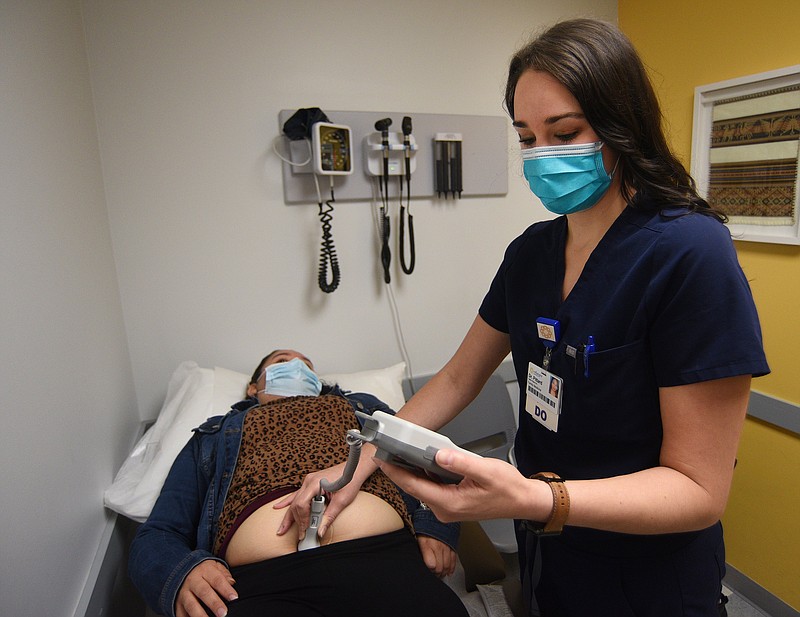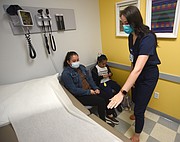Pregnancy can be a daunting process for any woman. But what if you recently moved to a new country, spoke a different language, didn't know a doctor or had never visited a hospital - then found out you were pregnant?
That is the reality for many women in Chattanooga's growing Hispanic community, which often faces significant barriers to health care - such as language, different cultural backgrounds, lack of transportation or health insurance, and in some cases immigration status or fear.
Too often, these barriers make it difficult for pregnant women to navigate the health care system, which results in delayed prenatal care and increased risk of complications in pregnancy, said Dr. Callie Pittard, a family medicine specialist and first-year advanced obstetrics fellow at Clinica Medicos in Chattanooga.
"We see people who walk [through] the door eight months pregnant who have never seen a doctor their whole pregnancy," Pittard said. "Maybe they've been at home and their husband's away at work, or they haven't been able to get to the clinic for whatever reason, so we just see them as much as we can and take care of them the best that we can when they are here."
In Hamilton County, 63% of Hispanic birth mothers did not receive prenatal care in the first trimester compared to 38% of mothers countywide, according to 2016 data in the health department's most recent community health profile.
Clinica Medicos is the city's only comprehensive bilingual primary care clinic that specializes in treating the region's underserved Latino population, including pregnant women, children, men and often entire families. Since opening its doors in 2015, physicians have delivered roughly 1,000 babies with the number of prenatal patients increasing each year, according to Clinica Medicos founder Dr. Kelly Arnold.
Arnold said a fragmented U.S. health care system that lacks culturally competent clinicians is to blame for disparities in Hispanic prenatal care, not the expectant mothers.
Many Clinica Medicos patients have limited or no experience with the health care system, and often when they do, those experiences are negative. Patients may come from countries where it is normal not to receive prenatal care and to deliver at home with a midwife rather than in a large hospital surrounded by white coats.
Obstetrics, the branch of medicine that specializes in pregnancy and childbirth, was historically a major component of family medicine, a primary care specialty whose physicians are trained to care for people of all ages from birth to older adulthood. However, the number of family physicians practicing obstetrics has declined dramatically in recent decades.
In 2003, roughly 11% of family physicians who practice obstetrics delivered one to 25 babies a year, 5% performed 26 to 50 deliveries and just over 2% performed more than 50 deliveries a year. Those percentages dropped to around 5%, 2% and 1%, respectively, by 2016, according to data from the American Board of Family Medicine.
As a whole, 10-15% of family physicians practice obstetrics, and even fewer perform Caesarean sections, according to Arnold. She said the decline is due in part to a greater emphasis on specialty care and a more litigious environment. Some hospitals now won't grant obstetrics privileges to family physicians.
"We've been fighting to preserve this model," Arnold said, adding that phasing obstetrics out of family medicine is particularly problematic for rural communities given that half of the nation's counties lack a practicing OB-GYN and access to maternal care is already a serious public health issue.
For underserved populations, Arnold said having the gamut of primary care services under one roof helps minimize the complexity and barriers that hinder access.
"When you really study an underserved community, it's inarguable that you will not create good care by fragmenting them," she said.
For Pittard, it's that ability to see her patients progress through the phases of life that drew her to primary care in the first place and then to Clinica Medicos' obstetrics fellowship, which teaches advanced obstetrics so family physicians can provide Caesarean deliveries, manage complicated pregnancies and neonatal patients.
As a fellow, Pittard splits her time between the hospital and the clinic on the corner of South Holtzclaw Avenue and East 23rd Street, where, in addition to her prenatal and postpartum patients, she works with the other providers to treat patients of all ages with everything from a respiratory infection to diabetes.
"Most clinics, you go somewhere for your obstetrical care, and then you have someone see the baby in the hospital, and then after you deliver you go see that obstetrical provider, but then your baby usually tends to go to a different clinic," Pittard said. "Here, you follow them the entire pregnancy, you deliver their baby, you take care of mom and baby in the hospital, and then you discharge them to your clinic to come see you. You take care of them in the clinic and you see that child grow up. I love that."
(READ MORE: Crossing cultural barriers: New clinic serves Chattanooga's growing Hispanic community)
Basic aspects of health care, such as how to obtain prescription refills or sign up for health insurance, are often foreign to her patients, Pittard said. Before sending them to the hospital, they get a detailed map with instructions in Spanish as well as English, so that if they need help along the way they can show it to others.
"For them to get to the hospital and to understand where to park, what the address is and how to get in the building, that they need to go to a certain floor in the hospital can be very tough for our patients, because it's a lot of information, especially if they haven't been there before," she said.
At least 80% of Clinica Medicos patients only speak Spanish, and the rest know some English but most all still prefer to speak in Spanish, Pittard said.
"So when we walk into the room and speak their native language, sometimes you just see their faces light up, because otherwise in the hospital they're having to use interpreters, translators to help speak to that patient," she said.
Arnold said that she hopes the Clinica Medicos obstetrics fellowship will inspire other physicians and communities to implement similar programs. Pittard is the fourth fellow to come through the program, with the first two starting July 2019 and completing their fellowship in June of 2021.
Pittard said she wants more Chattanoogans to recognize this vulnerable group living largely in the shadows.
"A lot of people aren't aware that this clinic is here and that there is a large population of Hispanic patients that we do serve that you don't necessarily see in the community very often, but that we take care of," Pittard said. "We're just trying to reduce those barriers that they might have at any other clinics or the healthcare system in general, and that's why we try to do as much as possible here - so they don't have to go to all the different places."
Contact staff writer Elizabeth Fite at efite@timesfreepress.com or follow her on Twitter @ecfite.

